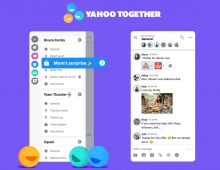
Yahoo Messenger Allows Users to Share Services
Yahoo is set to allow users to embed in its instant messaging service formerly independent programs that help them collaborate on activities ranging from calendar scheduling to watching videos or even trading commodities.
The company said it was introducing on Monday a handier way for tens of millions of users of Yahoo Messenger to share a variety of Web services, media or software created by independent software developers or by Yahoo itself.
Yahoo Messenger, the third-most-popular instant communications service after eBay's Skype and AOL's AIM, aims to make it easier for users of its instant text and voice communications services to collaborate over the Web by sharing applications simultaneously.
For example, a Yahoo Messenger user will be able to open up a version of Yahoo Calendar to friends and collectively plan to meet up by sharing local entertainment listings and maps while conversing over the messaging system.
The undertaking is a variation on a theme by many of the biggest Internet companies, including Microsoft Corp. , with its upcoming version of Windows, called Vista, Google Inc. , Time Warner's AOL unit and eBay Inc.'s Skype text, phone and video communications service.
Each aims to find ways to make the thousands of software programs originally designed to run on PC desktops more useful to Internet users by allowing them to share programs over Web-based instant-communications services.
Yahoo's effort builds on the growing popularity of "widgets," or mini-applications designed to work on computer desktops. Yahoo is making it possible for developers of thousands of these mini-applications to be incorporated into instant messaging services instead of sitting static on PCs.
Yahoo has signed up a variety of software developers to embed mini-applications within Yahoo Messenger to help users to simultaneously share Web programs.
Initial partners include 30 Boxes, a calendar-sharing site that competes with Google Calendar, commodities trading site Hedgestreet.com and Pando.com, which offers a service for sharing videos or other files via BitTorrent technology. More than 100 mini-programs will be available initially.
While anyone can build mini-applications to run in Yahoo Messenger -- even competitors -- Yahoo has guidelines to ensure they are secure and do not conflict with other software.
This aims to protect consumers from the reality that many of the Web's coolest new services must be downloaded and installed by the user and should come with special warning label of "some trouble-shooting required."
Initially, the service will be customized for use in 15 languages and 19 of the 21 markets in Europe, Asia and the Americas where Yahoo Messenger is now targeted, Bonforte said.
Yahoo plans to rely increasingly on independent software developers to create new features and services that can run on Messenger, instead of relying solely on internal innovations.
Yahoo is opening up Messager to make it more of a distribution platform. Future innovations on Messenger are more likely to come via new applications rather than requiring users to install a completely new version, Bonforte said.
Yahoo Messenger, the third-most-popular instant communications service after eBay's Skype and AOL's AIM, aims to make it easier for users of its instant text and voice communications services to collaborate over the Web by sharing applications simultaneously.
For example, a Yahoo Messenger user will be able to open up a version of Yahoo Calendar to friends and collectively plan to meet up by sharing local entertainment listings and maps while conversing over the messaging system.
The undertaking is a variation on a theme by many of the biggest Internet companies, including Microsoft Corp. , with its upcoming version of Windows, called Vista, Google Inc. , Time Warner's AOL unit and eBay Inc.'s Skype text, phone and video communications service.
Each aims to find ways to make the thousands of software programs originally designed to run on PC desktops more useful to Internet users by allowing them to share programs over Web-based instant-communications services.
Yahoo's effort builds on the growing popularity of "widgets," or mini-applications designed to work on computer desktops. Yahoo is making it possible for developers of thousands of these mini-applications to be incorporated into instant messaging services instead of sitting static on PCs.
Yahoo has signed up a variety of software developers to embed mini-applications within Yahoo Messenger to help users to simultaneously share Web programs.
Initial partners include 30 Boxes, a calendar-sharing site that competes with Google Calendar, commodities trading site Hedgestreet.com and Pando.com, which offers a service for sharing videos or other files via BitTorrent technology. More than 100 mini-programs will be available initially.
While anyone can build mini-applications to run in Yahoo Messenger -- even competitors -- Yahoo has guidelines to ensure they are secure and do not conflict with other software.
This aims to protect consumers from the reality that many of the Web's coolest new services must be downloaded and installed by the user and should come with special warning label of "some trouble-shooting required."
Initially, the service will be customized for use in 15 languages and 19 of the 21 markets in Europe, Asia and the Americas where Yahoo Messenger is now targeted, Bonforte said.
Yahoo plans to rely increasingly on independent software developers to create new features and services that can run on Messenger, instead of relying solely on internal innovations.
Yahoo is opening up Messager to make it more of a distribution platform. Future innovations on Messenger are more likely to come via new applications rather than requiring users to install a completely new version, Bonforte said.





















